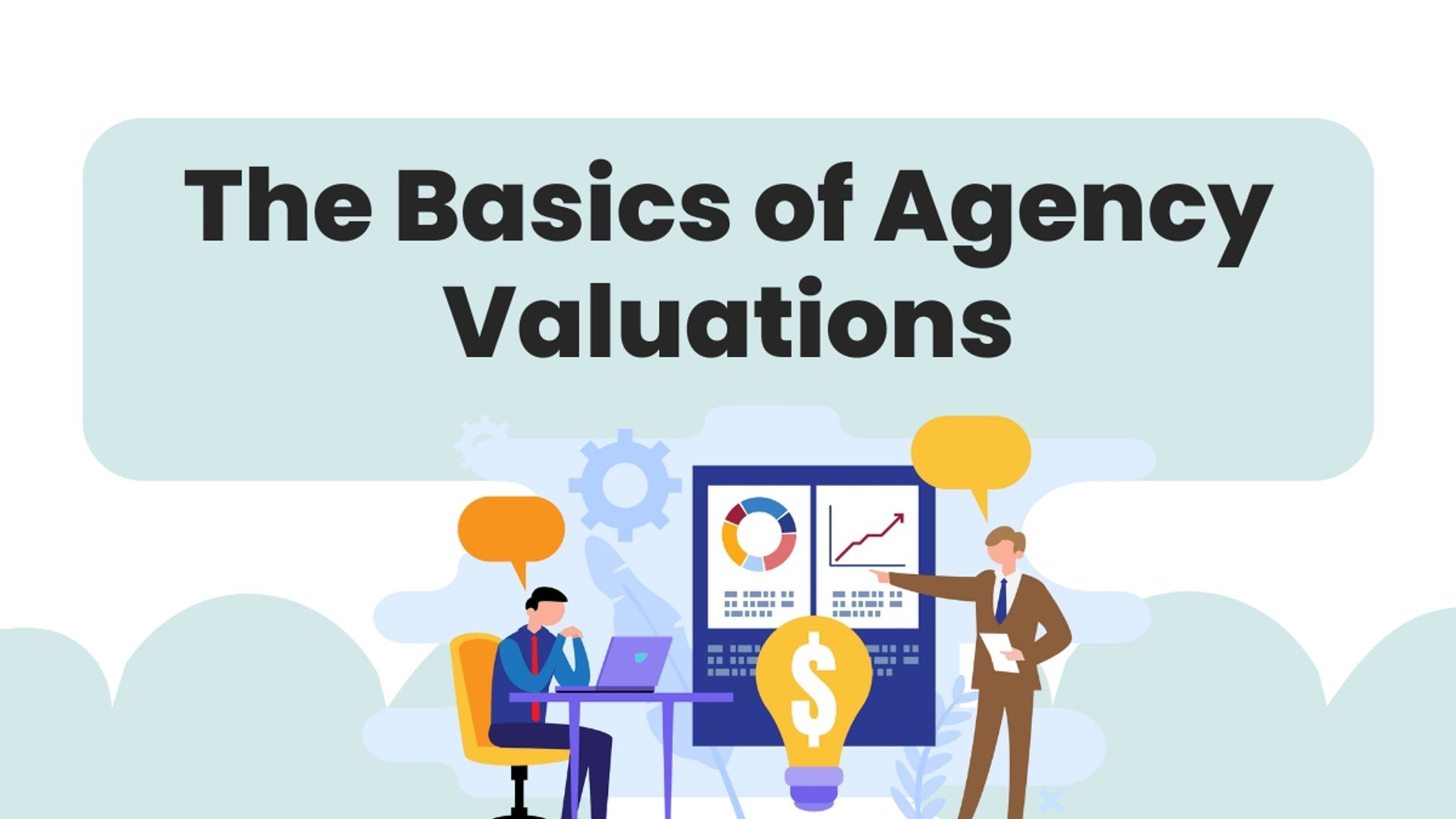Are you a business owner trying to pitch to investors but are struggling to convey your agency’s worth? Understanding the value of an agency is essential for various strategic decisions, including selling the business, attracting investors, or even just evaluating growth and performance. Agency valuation involves assessing financial metrics, analyzing market conditions, and considering qualitative factors to determine a company's worth. This article will help you understand what agency valuation is, explore different methods of valuation, and highlight the top metrics that determine an agency's value.
What is Agency Valuation?
The purpose of agency valuation extends beyond merely determining a sale price. It plays a critical role in various strategic initiatives, including mergers and acquisitions, securing investment, and strategic planning. By analyzing financial statements, market conditions, and intangible assets, stakeholders gain a nuanced understanding of the agency's current value and its potential for future growth.
The result of assessing an agency is frequently presented as a multiple, a proportion that shows how much a prospective buyer may be willing to spend based on the agency's earnings or other relevant measures. This multiple is derived from comprehensive analysis and reflects the agency's financial health, market competitiveness, and growth prospects. This systematic approach ensures that the valuation is robust and reflective of both the tangible and intangible elements that contribute to the agency's success.
Why is Agency Valuation Important?
Understanding the importance of agency valuation is essential for several key business activities. First and foremost, when negotiating a sale price with potential buyers, knowing the agency’s value ensures that you can secure a fair and profitable deal. This knowledge is equally important when seeking investment, as investors require a clear understanding of the agency’s worth to make informed funding decisions. Additionally, accurate valuations are crucial in the context of mergers and acquisitions, where they help determine fair and equitable terms for all parties involved. Beyond these transactional scenarios, agency valuations play a pivotal role in strategic planning, guiding owners in making informed decisions about growth, expansion, or restructuring. Overall, a thorough valuation provides a solid foundation for various strategic initiatives and business transactions.
Agency Valuation Methods
Determining the value of an agency involves various methods, each offering unique insights into the financial and operational aspects of the business. Selecting the appropriate valuation method requires careful consideration of the agency's characteristics, financial stability, market standing, and the specific objective of the valuation. Here, we will discuss three key valuation methods: Valuation Multiple, EBITDA Multiples, and Marketing Agency Valuation Multiples.
Valuation Multiple
A valuation multiple is a common metric used to assess an agency's worth. This multiple represents the ratio that indicates how much a potential buyer might be willing to pay, based on the agency's earnings or other essential financial metrics. Essentially, it is a factor by which the agency’s earnings are multiplied to estimate its market value. For instance, if an agency generates $2 million in annual revenue and applies a valuation multiple of 5, its estimated value will amount to $10 million.
The specific multiple used can vary widely depending on several factors, including industry standards, the agency’s financial health, growth prospects, and prevailing market conditions. By using a valuation multiple, stakeholders can quickly gauge the value of the agency straightforwardly, facilitating negotiations and investment decisions.
EBITDA Multiples
EBITDA, short for Earnings Before Interest, Taxes, Depreciation, and Amortization, is a key metric widely used in business valuation. It provides a clear view of the agency's operational profitability by excluding non-operating expenses that can distort financial performance. The EBITDA multiple measures an agency’s enterprise value relative to its EBITDA, providing valuable insight into its financial performance and operational efficiency.
To calculate the agency’s value using the EBITDA multiple, you multiply the agency’s EBITDA by the industry-specific multiple. For instance, if an agency has an EBITDA of $2 million and the industry multiple is 6, the agency’s estimated value would be $12 million. A higher EBITDA multiple typically indicates robust financial health, steady profitability, and attractive growth potential. This metric is particularly favored in mergers and acquisitions due to its ability to strip out extraneous factors and present a clear picture of the agency’s core earnings power.
Marketing Agency Valuation Multiples
Valuation multiples for marketing agencies can differ significantly from those of other service-based businesses due to the unique nature of their operations. Marketing agencies are often evaluated based on their service offerings, client base, market position, and growth potential. Key factors like an agency’s portfolio, long-term client relationships, digital presence, and areas of expertise are essential in determining the appropriate valuation multiple.
For instance, a marketing agency with a robust portfolio, strong digital presence, and long-term contracts with high-profile clients may command a higher multiple compared to one with less established credentials. Additionally, the rapidly evolving nature of the marketing industry means that agencies must continuously adapt to new trends and technologies, which can influence their valuation multiples.
Understanding marketing agency valuation multiples is crucial for accurately assessing the agency's market value. These multiples provide a framework that takes into account both financial metrics and industry-specific factors, ensuring that the derived value truly represents the agency’s worth. Taking these factors into account enables stakeholders to make well-informed decisions regarding mergers, acquisitions, and other strategic initiatives.
Top Metrics Determining Your Agency Value
Valuing an agency involves more than just analyzing financial statements. Both qualitative and quantitative factors significantly impact an agency's valuation. Here are the top metrics that determine an agency's value, each explained in greater detail:
1. History of Earnings
A consistent and growing history of earnings is a strong indicator of an agency's financial health and stability. Potential buyers or investors seek agencies with a proven track record of profitability because it signals reliability and the ability to generate steady cash flows. Historical earnings provide a foundation for predicting future performance, making the agency a more attractive investment.
2. Monitoring Project Statuses and Deadlines
Successful project management is essential for ensuring client satisfaction and achieving operational excellence. Agencies that consistently meet project deadlines and manage project statuses effectively are seen as reliable and well-organized. Consistent reliability fosters client trust, paving the way for repeat business and valuable referrals, ultimately increasing the agency's overall worth.
3. Seasonality of Revenue Income
Understanding the seasonality of revenue helps in assessing the stability and predictability of cash flows. Agencies with less seasonal variation in income are generally valued higher due to their steady revenue streams. Predictable revenue allows for better financial planning and reduces the risk associated with cash flow volatility, making the agency more appealing to investors and buyers.
4. Management Structure
A strong and experienced management team can significantly enhance an agency's value. Investors and buyers look for agencies with capable leaders who can drive growth, innovate, and manage operations efficiently. A well-structured management team provides confidence that the agency can sustain its performance and navigate market challenges effectively.
5. Diversified Risk
Agencies that have diversified their client base, revenue streams, and service offerings are perceived as less risky and more resilient to market fluctuations. Diversifying reduces reliance on a single client or industry, strengthening the agency's overall stability and resilience. A diversified risk profile means that the agency is better equipped to withstand economic downturns or industry-specific challenges.
6. Competitive Advantage or Niche
Agencies with a unique selling proposition (USP) or a strong niche in the market often command higher valuations. A well-defined competitive advantage can differentiate the agency from its competitors and attract premium clients. This differentiation could be due to specialized expertise, innovative service offerings, or superior client service, all of which contribute to the agency's market position and value.
7. Brand Image and Reputation
A strong brand image and a positive reputation in the market can significantly boost an agency's value. Brand equity reflects the agency's ability to attract and retain clients, which is a critical factor in long-term success. A well-regarded brand can command higher fees, attract better talent, and ensure client loyalty, all of which enhance the agency's financial performance and market appeal.
8. Location
The geographical location of the agency can influence its valuation. Agencies located in major business hubs or regions with high demand for their services are often valued higher due to better market opportunities and access to talent. A prime location can facilitate networking, attract high-profile clients, and provide a strategic advantage in competitive markets.
9. How Long You’ve Been in Business
The longevity of the agency in the market is a testament to its stability and experience. Agencies with a long-standing history are often perceived as more trustworthy and well-established, a factor that can significantly enhance their valuation. Longevity suggests that the agency has weathered various market conditions and has a proven business model that can be sustained over time.
10. Client Concentration
High client concentration, where a significant portion of revenue comes from a few clients, can be a risk factor. Agencies with a diversified client base are valued higher as they are less vulnerable to the loss of a single major client. A diverse client portfolio indicates a broad market appeal and reduces the financial impact of losing any one client, enhancing the agency's stability.
11. Client Retention
A high client retention rate reflects robust relationships and exceptional client satisfaction. Agencies that can retain clients over the long term are seen as more valuable due to their stable revenue streams. Retention is a sign of client trust and loyalty, which often leads to ongoing projects, referrals, and a steady income, all of which positively influence the agency's value.
12. Transition Structure
The ease with which the agency can transition to new ownership or management affects its valuation. Agencies with well-documented processes, a strong organizational structure, and clear succession plans are more attractive to buyers. A seamless transition reduces disruption and ensures continuity in operations, making the agency a less risky investment.
13. Other Assets
Other tangible and intangible assets, such as proprietary technology, intellectual property, and exclusive contracts, can also enhance an agency's value. These assets can provide competitive advantages and additional revenue streams. Proprietary tools or unique methodologies can differentiate the agency in the market, while exclusive contracts ensure guaranteed income, both contributing to the overall value.
Conclusion
Valuing an agency is a thorough process that examines a range of financial, operational, and market dynamics. A well-structured and transparent valuation process not only provides an accurate assessment of the agency's current worth but also highlights areas for improvement and opportunities for future success. Whether you are looking to sell your agency, attract investors, or simply evaluate your performance, a thorough understanding of agency valuation can provide the insights needed to achieve your goals.


